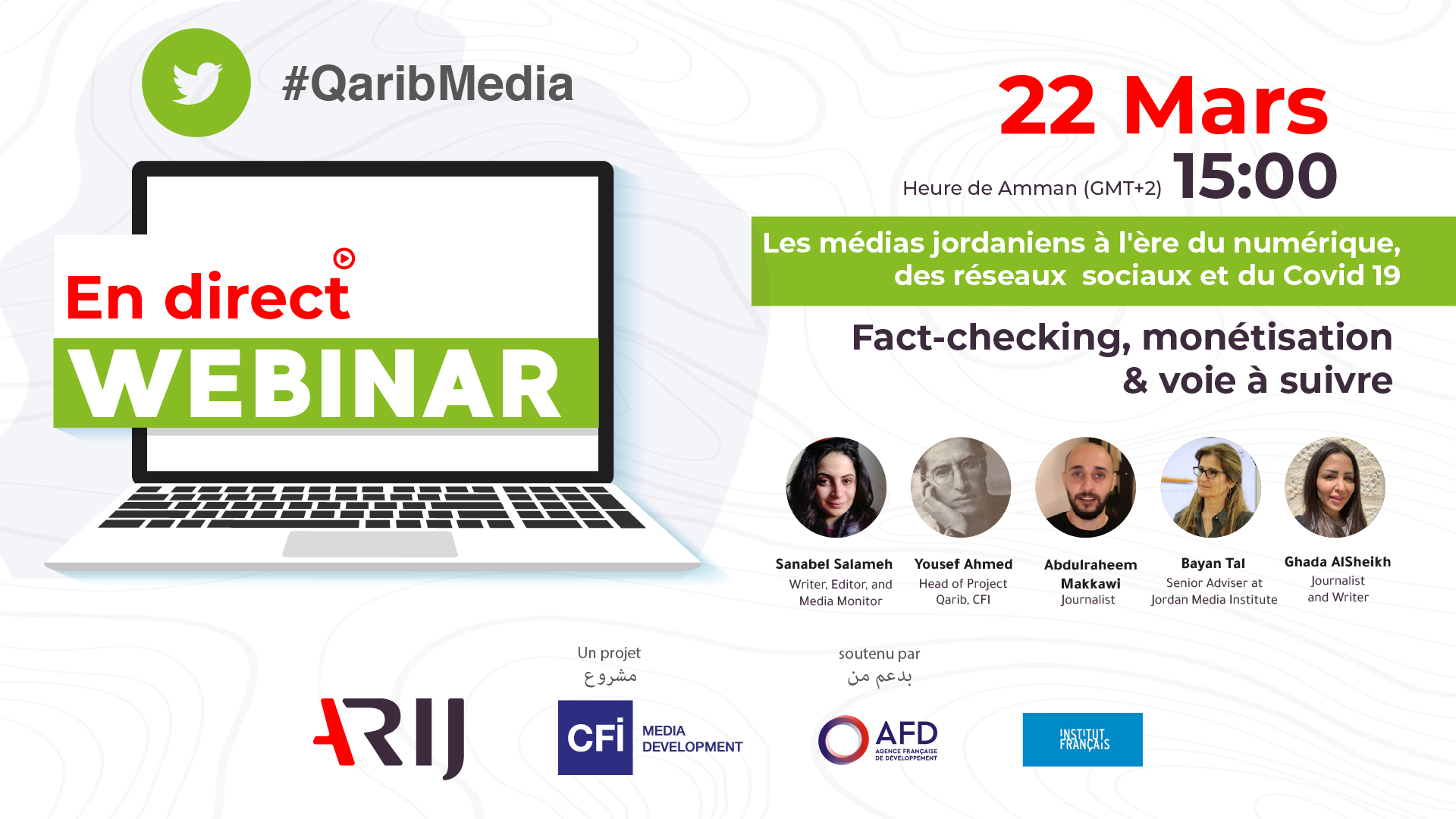The French Media Development Agency (CFI), in cooperation with the French Cultural Institute and ARIJ Network (Arab Reporters for Investigative Journalism), organized a webinar to discuss the challenges facing the Jordanian media in the age of digitization and the growing popularity of social media as a sources of news, especially during the COVID-19 pandemic.
The webinar, held on Monday 22 March 2021, represents the first work of the QARIB regional project, funded by the French Development Agency (AFD) and implemented by the French Media Development Agency (CFI). The project aims to strengthen social cohesion in Iraq, Jordan, Lebanon, and Palestine.
The webinar was held with the participation of Ghada Al Sheikh, a journalist and writer for the Jordanian newspaper Al-Ghad, Bayan Al-Tal, advisor to the Jordan Media Institute, Abdulraheem Makkawi, a journalist, and Sanabel Salameh, a writer and editor at Al-Hodood newspaper.
The webinar was moderated by the head of the QARIB – CFI project, Yousef Ahmed, who raised issues related to the role of media in combating fake news that spread during the pandemic, restoring trust in the media as an opinion-maker, working to attract young audiences, and achieving gender balance.
Sanabel Salameh, the editor of the satirical newspaper Al-Hodoud, said that Al-Hudood has an editorial policy that is careful to not confuse satire with false news, and that it has become the journalists’ job to fact check information and not just to report on them. She also stated that journalists should maintain their distance from social media, which makes the media a reliable source of covering news.
Ghada Al-Sheikh shed light on the experience of Al-Ghad newspaper, explaining that 80% of the ideas behind her reports were inspired by comments on social media. She also said that journalists should not forget their commitment to professionalism, credibility, and objectivity while chasing news and events.
Bayan Al-Tal stated that with the popularity of social media, it has become the responsibility of journalists and media institutions to explain the vast amount of information that is presented to the public and to make sense of it all, and to be trustworthy and present the topic in an objective and professional manner, and to link information to a logical framework.
Abdulraheem Makkawi said that journalists should know what audiences want, but now they sit in their offices far from their audience.
The speakers stressed on the need to develop and strengthen specialized journalism at the present time. Al Sheikh believes that specialized training is an important part of qualifying a specialist journalist, and Makkawi agreed with her, indicating that the journalist’s role is to simplify specialized topics for the ordinary audience, while Al-Tal believed that a journalist should be a specialist in any topic he/she covers.
Ahmed raised the issue of the relationship between the media and the youth, which Makkawi believed could be strengthened by including the youth in news coverage, and Al Sheikh agreed on this point, adding that opinion polls accompanied by the names of citizens have an effective role in ensuring their participation. While Al-Tal explained that public studies play a fundamental role in determining audiences’ preferences, Salameh stated that the studies are not always accurate.
The webinar concluded with a discussion of the issue of gender balance within media institutions. Al-Tal said media institutions are not keen on achieving gender balance between men and women in their work or in their coverage, and said that she worked on a project to support the participation of female experts in the topics covered by the media. Salameh said that the first step to ensure the participation of women is that women should free themselves from societal stereotypes and classifications.








